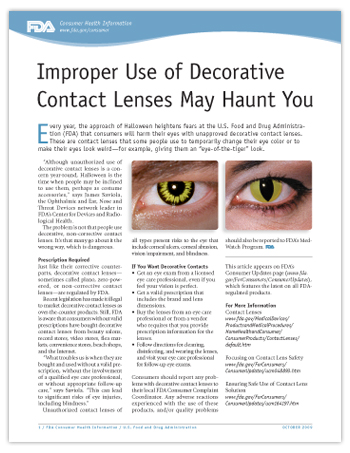For Consumers
Improper Use of Decorative Contact Lenses May Haunt You
|
For more videos, visit the FDA's YouTube Channel. |
| Please share copies of this printer-friendly PDF (300 KB)  |
 Get Consumer Updates by E-mail
Get Consumer Updates by E-mail
Every year, the approach of Halloween heightens fears at the U.S. Food and Drug Administration (FDA) that consumers will harm their eyes with unapproved decorative contact lenses. These are contact lenses that some people use to temporarily change their eye color or to make their eyes look weird—for example, giving them an "eye-of-the-tiger" look.
"Although unauthorized use of decorative contact lenses is a concern year-round, Halloween is the time when people may be inclined to use them, perhaps as costume accessories," says James Saviola, the Ophthalmic and Ear, Nose and Throat Devices network leader in FDA's Center for Devices and Radiological Health.
The problem is not that people use decorative, non-corrective contact lenses. It's that many go about it the wrong way, which is dangerous.
Prescription Required
Just like their corrective counterparts, decorative contact lenses—sometimes called plano, zero-powered, or non-corrective contact lenses—are regulated by FDA.
Recent legislation has made it illegal to market decorative contact lenses as over-the-counter products. Still, FDA is aware that consumers without valid prescriptions have bought decorative contact lenses from beauty salons, record stores, video stores, flea markets, convenience stores, beach shops, and the Internet.
"What troubles us is when they are bought and used without a valid prescription, without the involvement of a qualified eye care professional, or without appropriate follow-up care," says Saviola. "This can lead to significant risks of eye injuries, including blindness."
Unauthorized contact lenses of all types present risks to the eye that include corneal ulcers, corneal abrasion, vision impairment, and blindness.
If You Want Decorative Contacts
- Get an eye exam from a licensed eye care professional, even if you feel your vision is perfect.
- Get a valid prescription that includes the brand and lens dimensions.
- Buy the lenses from an eye care professional or from a vendor who requires that you provide prescription information for the lenses.
- Follow directions for cleaning, disinfecting, and wearing the lenses, and visit your eye care professional for follow-up eye exams.
Consumers should report any problems with decorative contact lenses to their local FDA Consumer Complaint Coordinator. Any adverse reactions experienced with the use of these products, and/or quality problems should also be reported to FDA's MedWatch Program.
This article appears on FDA's Consumer Updates page, which features the latest on all FDA-regulated products.
Updated: October 22, 2009








